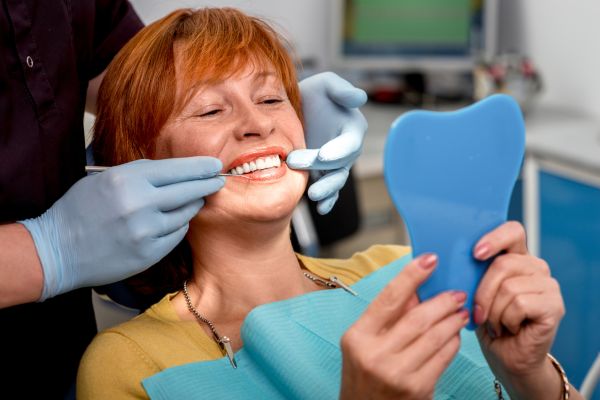6 Common Types of Dental Restoration: An Overview

Dental restoration is any treatment designed to restore the aesthetics and function of a damaged tooth. A dentist will ascertain the condition of the tooth and severity of the damage to decide the best option to restore your teeth. This article provides an overview of some of the common types of dental restoration available today.
6 Types of dental restoration
The following are some of the more popular dental restoration procedures provided by a dentist:
1. Dental fillings
Composite fillings are minimally invasive and help to preserve most of the tooth’s structure. It is commonly used for repairing a tooth affected by decay or cavities. Once the dentist removes the damaged or decayed parts, the composite filling will be bonded to the tooth and polished to look natural. The procedure requires little tooth preparation and can be completed in a single dental appointment.
2. Dental crowns
Dental crowns are used to protect a tooth with significant structural impairment. Dental crowns are sometimes called "tooth caps" because they cover the tooth completely, down to the gum line. Placing a crown typically requires two dental appointments, but some dentists provide same-day dental crowns. The procedure requires trimming down the affected tooth.
3. Dental bridges
A bridge is a combination of multiple dental crowns — usually three or four. They are used to cover the gap left by missing teeth. A bridge can connect to healthy teeth on either side of the gap or dental implants.
4. Dental implants
Dental implants give the closest feel to having a natural tooth. It uses an implant post to replace the tooth root, thus preserving bone health and dental alignment. Dental implants can restore one, multiple or all the teeth on a dental arch since they can support different dental restorations, including crown, bridges and dentures.
5. Inlays and onlays
These options are more prominent than dental fillings and smaller than dental crowns. Inlays and onlays are fabricated in the dental lab for dental damage that is too severe for fillings and too minimal for a dental crown. Inlays are used when the tooth cusp is intact, while onlays help to restore a tooth's damaged cusp.
6. Composite bonding
When a front tooth is chipped, filling it may be hard. Dental bonding with composite resin is used to rebuild broken teeth and restore their aesthetic appeal. The composite is applied layer after layer, hardened and then polished to the desired shape and size of the tooth.
What about cosmetic treatments?
Cosmetic procedures such as dental veneers are considered elective and not one of the important treatments to restore the tooth’s structure and function. However, cosmetic treatments can also have restorative benefits. For instance, dental veneers can improve the shape of a chipped tooth. Some of the dental restorations listed above can also enhance the smile’s appearance.
In conclusion
Nowadays, when it comes to dental restorations, patients have a lot of options to repair worn, damaged, decayed or missing teeth. A general dentist will determine the nature of the problem and recommend the best option to give you a healthy and beautiful smile.
Request an appointment here: https://totalcareimplantdentistry.com or call Total Care Dentistry & Implants at (760) 394-3088 for an appointment in our Palm Desert office.
Check out what others are saying about our services on Yelp: Read our Yelp reviews.
Related Posts
A family dentist is a dental professional who specializes in caring for the teeth and gums of people of all ages. With this being the case, we offer a wide range of services. Here is an outline of the most common treatments we provide.Routine professional cleanings are integral to maintaining optimal oral health. Our family…
Wondering how to practice good oral hygiene? Read on for some helpful tips from a family dentist. Good oral hygiene is a cornerstone of overall health and wellness. Regular visits to a family dentist for checkups, cleanings, and instruction in excellent oral hygiene are essential to maintaining healthy teeth and gums.The family dentist is the…
Dental bonding is a versatile and minimally invasive cosmetic procedure that can address various dental imperfections. This procedure, involving the application of a tooth-colored resin to restore or enhance teeth, offers patients a simple and cost-effective solution for achieving a brighter, more uniform smile. Dental bonding is ideal for repairing minor dental flaws without extensive…
A family dentist is an excellent choice for the entire family. If you are a parent, you know that the health of you, your children, and your partner are a top priority. Often, many parents do not schedule their dental appointments because scheduling conflicts with their children’s. This problem goes away when you find your…
